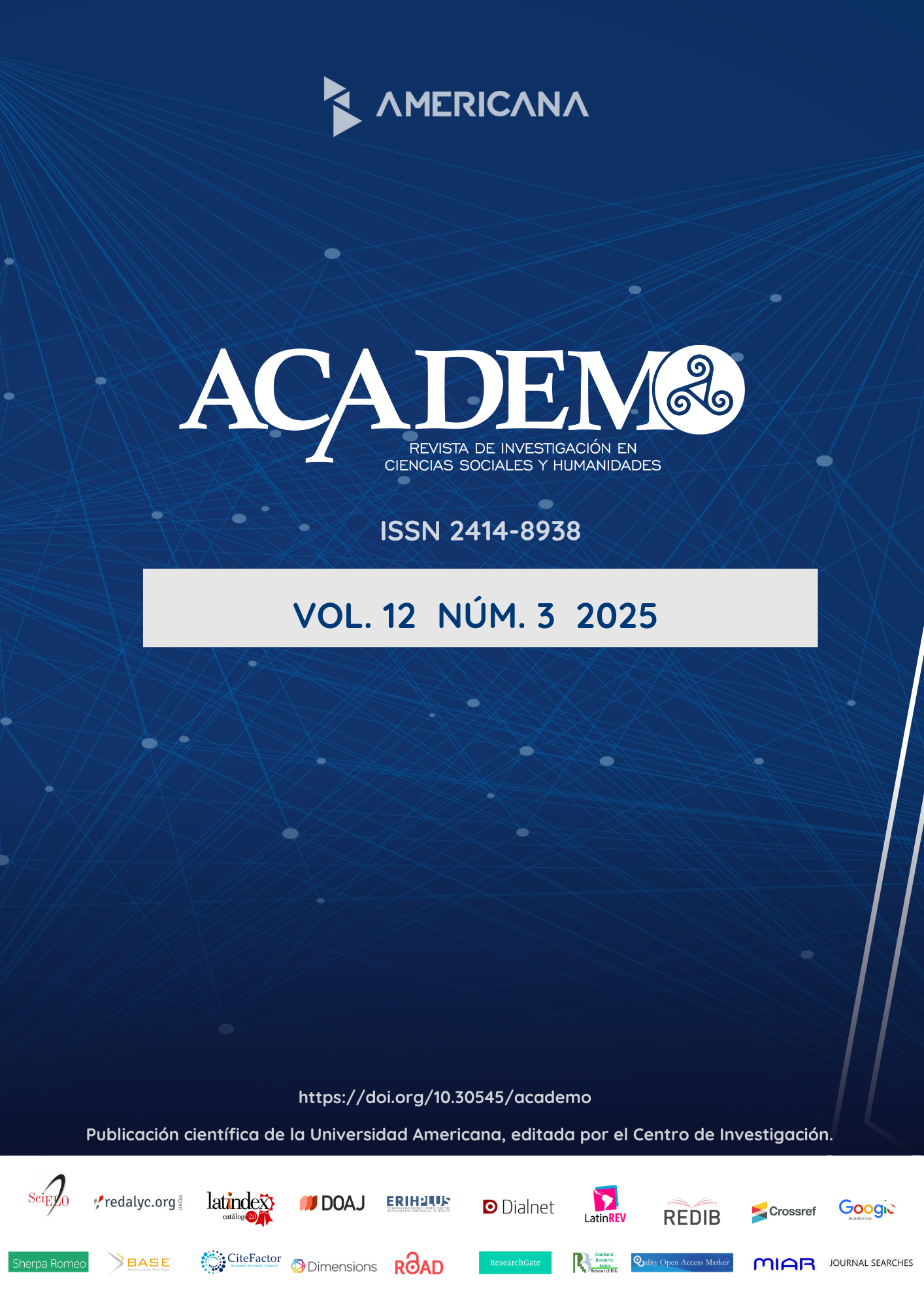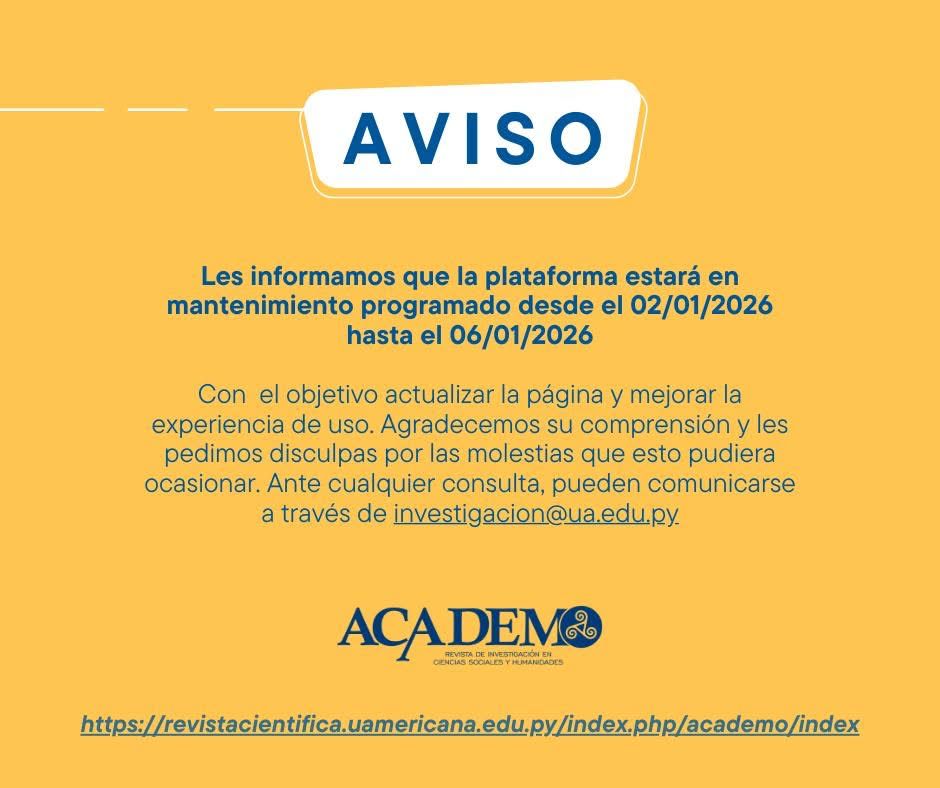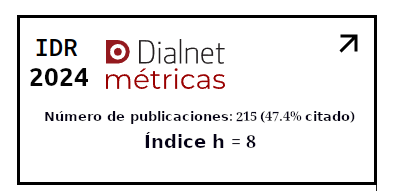The quality of democracy in Paraguay: causes and challenges
DOI:
https://doi.org/10.30545/academo.2025.n3.1279Keywords:
Democracy, quality, ParaguayAbstract
This article analyzes the causes of low democratic quality in Paraguay, a topic that has received limited scholarly attention despite its significance. Using a theoretical framework that distinguishes between the nature of democracy and its quality, the study focuses on three key dimensions: public support for democracy, the quality of governance, and socioeconomic performance. Drawing on data from Latinobarómetro, LAPOP, and The Economist Intelligence Unit, the analysis reveals persistent public dissatisfaction, deficiencies in governance indicators, and poor socioeconomic outcomes. The study identifies three main explanatory factors: Paraguay’s socioeconomic structure, which has produced a fragmented and “invertebrate” society lacking collective actors; the pervasive influence of clientelist political parties; and low levels of social capital. While these structural constraints limit the prospects for improvement and hinder significant progress in the short term, the article argues that there remains potential for transformative collective action, which could create opportunities for strengthening democracy in the future.
Downloads
References
Abente Brun, D. (1995). A party system in transition: The case of Paraguay. In S. Mainwaring & T. R. Scully (Eds.), Building democratic institutions: Party systems in Latin America (pp. 157–180). Stanford University Press.
Abente Brun, D. (2007). The quality of democracy in small South American countries: The case of Paraguay. Kellogg Institute for International Studies, Working Paper #343.
Abente Brun, D. (2011). Hacia una democracia de calidad (pp. 25–55). En D. Abente Brun & D. Borda (Eds.), El reto del futuro: Asumiendo el legado del bicentenario. Ministerio de Hacienda
Banco Mundial. (2024a). Plataforma de pobreza y desigualdad (PIP). https://pip.worldbank.org/
Banco Mundial. (2024b). De una tierra sin litoral a una tierra de oportunidades. Reporte de Crecimiento en Paraguay). https://pip.worldbank.org/
Barreda, M., & Bou, M. (2011). La calidad de la democracia paraguaya: Un avance sobre caminos tortuosos. América Latina Hoy, 56, 133–161. https://doi.org/10.14201/alh.7789
Bourscheid, J. I., & Stumpf González, R. (2019). Transición y precarización democrática paraguaya: los efectos de la baja calidad institucional y del comportamiento político negativo. Colombia Internacional, 98, 3-61.
Diamond, L., & Morlino, L. (Eds.). (2005). Assessing the quality of democracy. Johns Hopkins University Press.
Došek, T. (2023). El clientelismo en Paraguay: ¿Compra de votos o compra de participación electoral? Latin American Research Review, 58(3), 323–347. https://doi.org/10.25222/larr.1234
Duverger, M. (1954). Political parties: Their organization and activity in the modern world. Wiley.
Fukuyama, F. (1995). Trust: The social virtues and the creation of prosperity. London: Hamish Hamilton.
Garretón Merino, M. (2003). Incomplete democracy: Political democratization in Chile and Latin America. University of North Carolina Press.
Hagopian, F. (2005). Conclusions: Government performance, political representation, and public perceptions of contemporary democracy in Latin America. In F. Hagopian & S. P. Mainwaring (Eds.), The third wave of democratization in Latin America: Advances and setbacks. Cambridge University Press.
Instituto Nacional de Estadística. (2024). Población ocupada de 15 y más años de edad en la ocupación principal por año, según área de residencia, tamaño de empresa y años de estudio (2017–2019); Población de 15 y más años ocupada por año y ocupación informal no agropecuaria, según tamaño de la empresa (2017, 2022 y 2023) https://www.ine.gov.py/publicacion/3/empleo
Kircheimer, O. (1966). The transformation of the Western European party system. In L. LaPalombara & M. Weiner (Eds.), Political parties and political development (pp. 177–200). Princeton University Press.
Lachi, M., & Rojas Schefer, R. (2018). Correligionarios: Actitudes y prácticas políticas del electorado paraguayo. Asunción: Arandurã Editorial.
LAPOP Lab. (2023). El barómetro de las Américas 2023: Pulso de la democracia en Paraguay.Vanderbilt. https://www.vanderbilt.edu/lapop/paraguay/ABPRY2023-Pulso-de-la-democracia-final-20240508.pdf
Latinobarómetro. (2024). Informe Latinobarómetro 2024: La democracia resiliente. Corporación Latinobarómetro. Recuperado de https://www.latinobarometro.org/lat.jsp
Levine, D. H., & Molina, J. E. (Eds.). (2011). The quality of democracy in Latin America. Lynne Rienner Publishers.
Linz, J. J., & Stepan, A. (1996). Problems of democratic transition and consolidation: Southern Europe, South America, and post-communist Europe. Johns Hopkins University Press.
Lipset, S. M. (1959). Some social requisites of democracy: Economic development and political legitimacy. American Political Science Review, 53(1), 69–105.
Mainwaring, S., O’Donnell, G., & Valenzuela, J. S. (Eds.). (1992). Issues in democratic consolidation: The new South American democracies in comparative perspective. University of Notre Dame Press.
O'Donnell, G. (1973). Modernization and bureaucratic-authoritarianism: Studies in South American politics. Berkeley: Institute of International Studies.
O’Donnell, G., Schmitter, P. C., & Whitehead, L. (Eds.). (1986). Transitions from authoritarian rule: Latin America. Johns Hopkins University Press
O’Donnell, G., Vargas Cullell, J., & Iazzetta, O. M. (Eds.). (2004). The quality of democracy: Theory and applications. University of Notre Dame Press.
Panebianco, A. (1988). Political parties: Organization and power (M. Silver, Trans.). Cambridge University Press.
Pierson, P. (2004). Politics in Ttime: History, institutions, and social analysis. Princeton University Press.
Rueschemeyer, D., Huber Stephens, E., & Stephens, J. D. (1992). Capitalist development and democracy. University of Chicago Press.
Ostrom, E. (1990). Governing the commons: The evolution of institutions for collective action. Cambridge University Press.
Pérez Talia, M. (2017). La institucionalización partidista y su relación con la calidad de la democracia: Paraguay y Uruguay en perspectiva comparada. Revista Mexicana de Ciencias Políticas y Sociales, 62(229), 297-330.
PNUD. (2024). Informe sobre desarrollo humano 2023–24: Romper el estancamiento: Reimaginar la cooperación en un mundo polarizado. PNUD. Recuperado de
https://hdr.undp.org/content/human-development-report-2023-24
Przeworski, A., Alvarez, M. E., Cheibub, J. A., & Limongi, F. (2000). Democracy and development: Political institutions and well-being in the world, 1950–1990. New York: Cambridge University Press.
Putnam, R. (1993). Making Democracy Work: Civic Traditions in Modern Italy. Princeton: Princeton University Press.
Setrini, G. F. (2025). Regime change and alternancia clientelar: From monopolistic to pluralistic clientelism in post-Stroessner Paraguay. Latin American Perspectives, 52(1)
The Economist Intelligence Unit. (2024). Democracy Index 2024. The Economist Group. https://www.eiu.com/n/campaigns/democracy-index-2024/
Tusell Collado, A. (2023). Calidad de la democracia en América Latina, 2013-2018: una clasificación con observaciones de conglomerado y dendrograma. Estado & Comunes, 2(17), 39–56
Valdebenito, A. (2022). La calidad de la democracia en América Latina: en estudio comparado de la democracia latinoamericana en el decenio 2009-2019. Revista de Ciencia Política, 60(1), 934.
Weber, M. (2019). Economía y sociedad (J. A. V. M. L. C. Martínez, Ed.). Siglo XXI Editores. (Original publicado en 1922).










